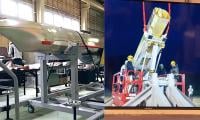Fire safety at factories remains an unresolved issue
KarachiTwo prominent rights organisations, in their recently published reports, had expressed their concerns over the poor conditions of the occupational health and safety in the industrial sector in the country, particularly in Karachi.A fire at a garment a factory in SITE on Monday corroborates their apprehensions on the issue of
By Zia Ur Rehman
May 05, 2015
Karachi
Two prominent rights organisations, in their recently published reports, had expressed their concerns over the poor conditions of the occupational health and safety in the industrial sector in the country, particularly in Karachi.
A fire at a garment a factory in SITE on Monday corroborates their apprehensions on the issue of precautions and safety equipments at workplaces.
At least 16 factory workers, six of them women, and two firefighters, were injured in the blaze.
The factory in the SITE area is not far from Baldia Town, where a fire in a garment factory, Ali Enterprises, in September 2012, considered to be the country’s worst industrial mishaps, killed over 250 people and injured many others.
In a report, the Pakistan Institute of Labour Education and Research (Piler) had demanded that the government should ensure efficient labour inspection mechanisms in the provinces. “Occupational safety and health, the core element of a decent work environment, remains the lowest priority of the stakeholders despite the rising incidences of work related injuries, diseases and fatalities in recent years,” it was stated in the report.
The Baldia Factory Fire also did not compel the state officials and the employers to devise a comprehensive plan for prevention of industrial accidents, it was observed.
Shujauddin Qureshi, an expert on labour issues associated with Piler, said the situation of occupational health and safety was rapidly deteriorating in the country and there was no independent legislation on health and safety except the Factories Act 1934.
“After the Baldia factory fire, there was immense pressure on the government to take notice of factory standards and putting in place fire safety measures but it overlooked it,” Qureshi told The News.
The International Labour Organisation (ILO) has devised over 40 standards specifically dealing with occupational safety and health, as well as over 40 codes of practice.
There are three fundamental standards: the Occupational Safety and Health Convention 1981 No. 155, Occupational Health Services Convention 1985 No.161, and the Promotional Framework for Occupational Safety and Health Convention 2006 No.187. However, Pakistan has not ratified any of these conventions reflecting low State priority to the safety and health of workers.
Pakistan has ratified the ILO Labour Inspection Convention No. 81 and under this convention Pakistan is bound to educate and inform employers and workers on their legal rights and obligations concerning all aspects of labour protection and labour laws and advise employers and workers to comply with the requirements of the law and enable inspectors to report to superiors on problems and defects that are not covered by laws and regulations.
The Human Rights Commission of Pakistan (HRCP), in its recently released annual report, also showed its dismay over the serious violations of labour laws and criminal negligence of government authorities.
The report suggests that the provincial labour department is responsible for documenting industrial accidents under various laws. However, due to poor governance and inefficient functioning, documentation is not done regularly and it is rarely shared with the public. Hence the only source of information on industrial accidents is the media.
The HRCP also stated in its report that 38 industrial accidents took place in the country in 2014, causing the death of 82 workers.
The causes included boiler explosions, roofs collapsing at construction sites, electrocution and coal mine accidents. Boiler explosions are frequent and the reasons include lack of qualified boiler engineers and maintenance and inspection.
Two prominent rights organisations, in their recently published reports, had expressed their concerns over the poor conditions of the occupational health and safety in the industrial sector in the country, particularly in Karachi.
A fire at a garment a factory in SITE on Monday corroborates their apprehensions on the issue of precautions and safety equipments at workplaces.
At least 16 factory workers, six of them women, and two firefighters, were injured in the blaze.
The factory in the SITE area is not far from Baldia Town, where a fire in a garment factory, Ali Enterprises, in September 2012, considered to be the country’s worst industrial mishaps, killed over 250 people and injured many others.
In a report, the Pakistan Institute of Labour Education and Research (Piler) had demanded that the government should ensure efficient labour inspection mechanisms in the provinces. “Occupational safety and health, the core element of a decent work environment, remains the lowest priority of the stakeholders despite the rising incidences of work related injuries, diseases and fatalities in recent years,” it was stated in the report.
The Baldia Factory Fire also did not compel the state officials and the employers to devise a comprehensive plan for prevention of industrial accidents, it was observed.
Shujauddin Qureshi, an expert on labour issues associated with Piler, said the situation of occupational health and safety was rapidly deteriorating in the country and there was no independent legislation on health and safety except the Factories Act 1934.
“After the Baldia factory fire, there was immense pressure on the government to take notice of factory standards and putting in place fire safety measures but it overlooked it,” Qureshi told The News.
The International Labour Organisation (ILO) has devised over 40 standards specifically dealing with occupational safety and health, as well as over 40 codes of practice.
There are three fundamental standards: the Occupational Safety and Health Convention 1981 No. 155, Occupational Health Services Convention 1985 No.161, and the Promotional Framework for Occupational Safety and Health Convention 2006 No.187. However, Pakistan has not ratified any of these conventions reflecting low State priority to the safety and health of workers.
Pakistan has ratified the ILO Labour Inspection Convention No. 81 and under this convention Pakistan is bound to educate and inform employers and workers on their legal rights and obligations concerning all aspects of labour protection and labour laws and advise employers and workers to comply with the requirements of the law and enable inspectors to report to superiors on problems and defects that are not covered by laws and regulations.
The Human Rights Commission of Pakistan (HRCP), in its recently released annual report, also showed its dismay over the serious violations of labour laws and criminal negligence of government authorities.
The report suggests that the provincial labour department is responsible for documenting industrial accidents under various laws. However, due to poor governance and inefficient functioning, documentation is not done regularly and it is rarely shared with the public. Hence the only source of information on industrial accidents is the media.
The HRCP also stated in its report that 38 industrial accidents took place in the country in 2014, causing the death of 82 workers.
The causes included boiler explosions, roofs collapsing at construction sites, electrocution and coal mine accidents. Boiler explosions are frequent and the reasons include lack of qualified boiler engineers and maintenance and inspection.
-
 Brooklyn Beckham's Wedding Dance With Mom Victoria Sparks Hilarious Memes
Brooklyn Beckham's Wedding Dance With Mom Victoria Sparks Hilarious Memes -
 King Charles' Latest Photos A Statement On His Health?
King Charles' Latest Photos A Statement On His Health? -
 Tom Cruise's Biggest Dream Crushed By The President?
Tom Cruise's Biggest Dream Crushed By The President? -
 King Charles, Queen Camilla Send Message To King Of Spain After Train Crash
King Charles, Queen Camilla Send Message To King Of Spain After Train Crash -
 'We Believe Brooklyn': David Beckham Trolled After Son's Statement
'We Believe Brooklyn': David Beckham Trolled After Son's Statement -
 Microsoft CEO Says AI Must Deliver Real World Impact To Survive
Microsoft CEO Says AI Must Deliver Real World Impact To Survive -
 Stranger Knocks, Then Opens Fire On Indiana Judge And Wife
Stranger Knocks, Then Opens Fire On Indiana Judge And Wife -
 Priscilla Presley's Derogatory Remarks On Late Daughter Lisa Marie Reignite Controversy
Priscilla Presley's Derogatory Remarks On Late Daughter Lisa Marie Reignite Controversy -
 Japan Unveils Anti-ship Missile With ‘barrel-roll’ Evasion To Outsmart Defenses
Japan Unveils Anti-ship Missile With ‘barrel-roll’ Evasion To Outsmart Defenses -
 How Brooklyn Beckham 'mentor' Prince Harry Inspiring Him To Speak Against Family?
How Brooklyn Beckham 'mentor' Prince Harry Inspiring Him To Speak Against Family? -
 Zac Efron, Kenny Ortega Revisit 'High School Musical' After 2 Decades
Zac Efron, Kenny Ortega Revisit 'High School Musical' After 2 Decades -
 Threads Overtakes X On Mobile Users: Here’s Why Everyone’s Switching
Threads Overtakes X On Mobile Users: Here’s Why Everyone’s Switching -
 Kanye West Eyes Performing First-ever Concert In India
Kanye West Eyes Performing First-ever Concert In India -
 Brooklyn Beckham's Claim About Nicola's Wedding Ordeal Gets Challenged
Brooklyn Beckham's Claim About Nicola's Wedding Ordeal Gets Challenged -
 AI Horror: 4 In 5 Young Workers Fear 'AI Could Replace Their Jobs', Says Report
AI Horror: 4 In 5 Young Workers Fear 'AI Could Replace Their Jobs', Says Report -
 Missouri Couple ‘locked Sons In Chicken Pen, Shot Them’ In Shocking Abuse Case
Missouri Couple ‘locked Sons In Chicken Pen, Shot Them’ In Shocking Abuse Case



